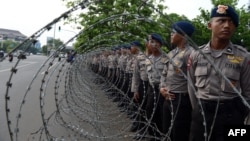President Joko Widodo's Monday announcement of reduced government fuel subsidies has gas consumer gas prices to climb by 30 percent, sparking a public transportation strike in the city of Solo.
Joko Suprapto, who chairs the Organization of Land Transport Owners in the central Javan city, announced that all public transportation there is on strike in an effort to urge the government to reconsider the price increase.
“At least give us some kind of relief; give us subsidies for spare parts or other incentives," he said. "The government has imposed a limit on bus fare hikes to just 10 percent. That is unrealistic. We reject it — with the conditions in the field it should be 25-30 percent.”
Although Solo city officials oppose the government plan, they are being forced to adjust by initiating budget cuts and deferring development projects.
In an effort to minimize effects of the strike, the government has prepared other means of public transportation. A spokesman for the East Java transit agency, Djoko Widodo, tells VOA a number of military and government vehicles have been deployed to Solo to aid stranded passengers.
“We are looking at the province’s condition, like this morning, when the strike occurred, [we] immediately coordinated with the military, police and city government to have their trucks and their operational transportation to drive passengers, free of charge," the spokesman said. "The point is, the strike only occurred in Solo.”
A series of demonstrations are expected to take place in Solo in the coming days with hopes of spurring a government plan to drive fuel prices down.
The president has acknowledged the unpopularity of his decision, but justified the move as a necessary compromise to maximize government subsidies for the poor.
The president said steps must be taken so that the fuel subsidies can be redirected to more substantive budgets, such as infrastructure and education.
This report was produced in collaboration with the VOA Indonesian service.




